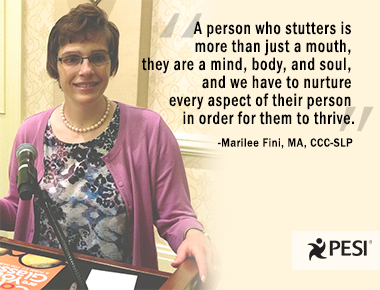Nurturing the Mind, Body and Soul of Those Who Stutter

I began to stutter at 4 years old. As a child, it was something I hated and found deeply embarrassing. Throughout elementary school and high school, I had a lot of therapy focused on fluency. And while addressing the physical aspect of my stuttering was important, no one seemed to understand or recognize the need to also address the emotional aspect of my disorder.
While everyone was concerned about “my speech” and how it sounded, I felt like I was dying inside. I was so embarrassed and shameful about the way I talked that I avoided speaking at times, especially at school.
As an adult, I decided to pursue a career in speech pathology because I wanted to make a difference for others dealing with communication disorders. I wanted to help others find ways to feel “good” about communication—regardless of how their words came out. I wanted them to know their spoken words had value, because as a child who stuttered, I didn’t know this.
When pursuing my Master’s Degree in Speech Pathology, I joined the National Stuttering Association. I didn’t know it at the time, but this decision would truly change the trajectory of my career. Being part of the NSA taught me that I was more than my stuttering, and it helped me to deal with feelings of shame and embarrassment related to my stuttering. I began realizing that anything was possible in terms of speaking. For the first time in my life, I had opportunities to practice public speaking, and I felt good about communicating with others!
When I started my private practice 15 years ago, I decided to do some public speaking to help educate my community about communication disorders. Even though I had presented through the NSA, in the back of my mind I kept thinking, “this is silly, I will stutter a lot, and no one will ever come to me for help.”
My first presentations were hard, and a lot of sweat and tears were involved. Then something happened; public speaking became my passion! As my confidence surrounding public speaking grew, so did the length of my presentations. Short presentations turned into half day workshops, and today I present whole day workshops and keynote addresses.
When I stand in front of others to do public speaking, something magical happens. I let out that “voice” that was held back as a child, and I rejoice in my freedom to express myself!
If you work with clients who stutter, I encourage you to not only work on the physical symptoms, but to also take care of the emotional feelings and attitudes that are part of these disorders. It’s critical to remember that a person who stutters is more than just a mouth, they are a mind, body, and soul, and we have to nurture every aspect of their person in order for them to thrive.
This post has been brought to life by PESI speaker Marilee Fini, MA, CCC-SLP.
While everyone was concerned about “my speech” and how it sounded, I felt like I was dying inside. I was so embarrassed and shameful about the way I talked that I avoided speaking at times, especially at school.
As an adult, I decided to pursue a career in speech pathology because I wanted to make a difference for others dealing with communication disorders. I wanted to help others find ways to feel “good” about communication—regardless of how their words came out. I wanted them to know their spoken words had value, because as a child who stuttered, I didn’t know this.
When pursuing my Master’s Degree in Speech Pathology, I joined the National Stuttering Association. I didn’t know it at the time, but this decision would truly change the trajectory of my career. Being part of the NSA taught me that I was more than my stuttering, and it helped me to deal with feelings of shame and embarrassment related to my stuttering. I began realizing that anything was possible in terms of speaking. For the first time in my life, I had opportunities to practice public speaking, and I felt good about communicating with others!
When I started my private practice 15 years ago, I decided to do some public speaking to help educate my community about communication disorders. Even though I had presented through the NSA, in the back of my mind I kept thinking, “this is silly, I will stutter a lot, and no one will ever come to me for help.”
My first presentations were hard, and a lot of sweat and tears were involved. Then something happened; public speaking became my passion! As my confidence surrounding public speaking grew, so did the length of my presentations. Short presentations turned into half day workshops, and today I present whole day workshops and keynote addresses.
When I stand in front of others to do public speaking, something magical happens. I let out that “voice” that was held back as a child, and I rejoice in my freedom to express myself!
If you work with clients who stutter, I encourage you to not only work on the physical symptoms, but to also take care of the emotional feelings and attitudes that are part of these disorders. It’s critical to remember that a person who stutters is more than just a mouth, they are a mind, body, and soul, and we have to nurture every aspect of their person in order for them to thrive.
This post has been brought to life by PESI speaker Marilee Fini, MA, CCC-SLP.


